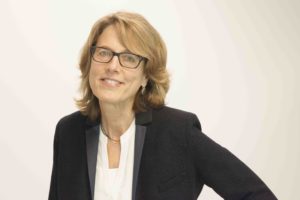

Peggy Wallace, managing partner of Golden Seeds and board observer of Paradigm4
May 5, 2018 Golden Seeds is focused on investing in the vibrant opportunities of women-led companies. As such, we work with many talented, passionate female entrepreneurs who are doing truly remarkable things. Our “How Did She Do It?” series shares the stories, challenges and successes of the women behind the companies of Golden Seeds.
Golden Seeds is focused on investing in the vibrant opportunities of women-led companies. As such, we work with many talented, passionate female entrepreneurs who are doing truly remarkable things. Our “How Did She Do It?” series shares the stories, challenges and successes of the women behind the companies of Golden Seeds.
Today, Peggy Wallace interviews Marilyn Matz, CEO and Co-Founder of Paradigm4 (pictured, left).
Below, they discuss how Matz co-founded her company, which is transforming industries through the use of data and analytics.
Paradigm4’s SciDB is an innovative computational database for mining insights from genomic, clinical, imaging, financial markets, sensors and environmental data. It makes diverse, multi-dimensional, high resolution data explorable and actionable, enabling scientists and data scientists to create new insights, products and services.
MM: The SciDB project started as a good deed for scientists by a group of academic computer scientists. My co-founder, Turing Laureate and MIT Professor Mike Stonebreaker, has been a leader in the database field for more than 30 years. After conversations with astrophysicists and other scientists, he and his colleagues recognized that the scientists needed new tools to manage, integrate and analyze big, complex and diverse data sets — and that what the scientists needed would also be directly applicable for commercial applications as companies embraced data science. But he realized that he couldn’t build a robust commercial software product with a pick-up group of academic coders. He needed funding, as well as a partner to help him build the product and company he envisioned.
At the time, I was eager to launch another startup (my first was Cognex Corporation). I was introduced to Mike by a venture capitalist in Boston. From there we decided to work together and co-founded Paradigm4.
MM: The data that’s being generated today is different. When the big relational database management companies began, the world wasn’t spewing out vast quantities of data from phones, cars, cameras, wearables, genomic sequencers, and other devices and instruments. Many companies today are trying to fit a round peg into a square hole by repurposing legacy systems that don’t fit these new data. Those systems weren’t designed to answer the complex questions people ask about data today. Newer, competing systems are often pieced together from a deep stack of independently moving software modules, which then struggle to provide good price/performance or maintainable systems. At the end of the day, there’s no one-size-fits-all system, so customers need to pick the right tool — and the right partner — to do the job.
We offer a purpose-built, all-in-one, data management and scalable computation engine to organize, combine and mine all these new and diverse data — at population scales.
MM: Our data insight engine can solve a wide range of problems, from translational medicine and population health, to climatology and industrial IoT. One of the biggest challenges we had was focusing in on the right product-market fit where SciDB provides a differentiating and compelling offering that enables our customers to create scientific or business value. Within the last three years we’ve focused on life sciences and healthcare.
There was no easy route here, and this process involved quite a bit of trial and error. The key was to talk/listen to many prospects, do lots of pilots, and critically evaluate what worked and what didn’t, and which of those represented repeatable market opportunities. If you are fortunate enough to have an early adopter — as we did with the NIH NCBI — that helps you pivot and focus the company, which is invaluable.
MM: Right now we are working with top 10 pharma and biotech companies, research institutions, and government agencies. Our biggest challenge is scaling the business and finding strategic partners to help expand our reach. Now that we’ve identified key applications that we enable in translational and digital medicine, the challenge is getting to the right people in these organizations.
MM: There’s a Tim O’Reilly quote I like: “Pursue something so important that even if you fail, the world is better off with you having tried.” Clearly, we’re determined to make this a successful venture, but building a company is such a roller coaster experience of highs and lows that both you and your team have to believe what you’re doing is important and care deeply about it. People make sacrifices to commit to and invest their time in an early stage company; they want to be part of a compelling vision they can buy into and believe that what they are doing matters greatly.
Always be transparent with your team about the company’s situation. Share successes: they are an important and powerful bonding experience. And if something isn’t working, confront it sooner rather than later. Pay attention to your gut and don’t worry about accumulating enough evidence to justify an action so that you can keep the team and the company moving in the right direction.
MM: Golden Seeds is indeed smart money, especially for a female entrepreneur. Having the wise but brutally honest counsel, the extensive network, and the strong support of deeply experienced women and men has proven to be invaluable.
For example, I recently presented at the Annual Golden Seeds Summit, where I shared a list of people and companies Paradigm4 is targeting. Immediately afterward, several attendees offered to make introductions. I wouldn’t have had access to that valuable network without Golden Seeds.
For more wisdom like this from other amazing female leaders, follow Golden Seeds on Twitter.